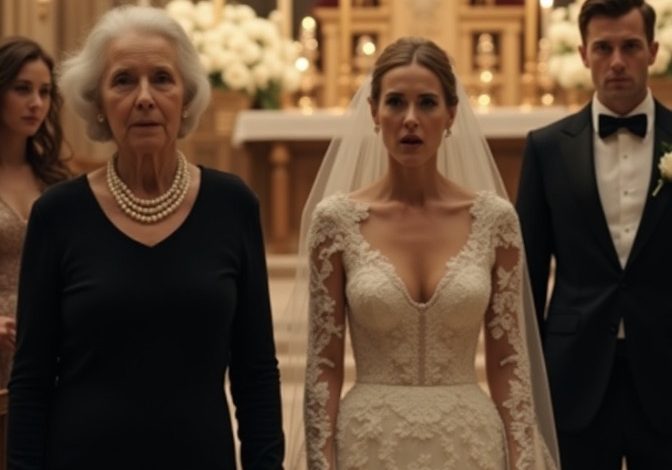“Uninvited to Her Own Granddaughter’s Wedding, This Grandmother Walked Into the Church and Changed Everything”

My granddaughter once told me I didn’t “fit the theme,” so she didn’t invite me to her wedding. But I went anyway. I walked right into that church, handed the pastor a folder, and when he opened it… the entire room froze.
Everyone in the family had received an invitation—everyone except me. They said I wouldn’t “match the theme.” They acted like I was just a background shadow, too plain, too old, too small for their new picture of life. But they forgot one important thing: I raised the woman who raised the bride. Without me, there wouldn’t even be a wedding. So when I stepped inside that church, I stepped in like I belonged—because deep down, I knew I did.
My name is Mabel Johnson. I’m sixty-eight years old. I’ve lived long enough to understand how people will take from you until there’s nothing left, then toss you aside when they think you’ve lost your shine. I raised three children with my bare hands and a worn pair of shoes. I worked double shifts at the diner, scrubbed other people’s floors, and held two jobs while my own house sat cold and dark. When my husband walked out and never looked back, my youngest, Charlene, was only five. I became mother, father, and provider all at once.
Years later, Charlene had a daughter—Jessica. And when Charlene chose men and parties over responsibility, it was me who stepped in. I raised Jessica, just like I raised the rest. I was there when she spoke her first words, when she scraped her knees, when she stood on stage for school plays. I packed her lunches, clapped in cold bleachers, and stayed up nights sewing costumes when money was tight. Jessica was my heart. But somewhere along the way, she decided I was no longer enough.
It started when Charlene married Gregory, a man with polished shoes and empty eyes. He had money, connections, and a voice that dripped with charm. But under that smile was coldness. He looked at me like I was a relic of another time, something to hide away in an attic. Slowly, little by little, I felt them pulling away. They didn’t say it outright, but I saw it in the way they winced when I showed up in my old clothes, or when I spoke the plain truth in front of their fancy friends. They acted like I didn’t belong anymore, like I was an embarrassment.
Then came the wedding.
One Sunday afternoon, I sat on my porch with a glass of sweet tea, waiting for the mailman. I’d heard whispers that Jessica was engaged, but no one had said a word to me directly. When the mail arrived, there was no envelope. No invitation. Later that day, my neighbor Miss Louise walked over, smiling wide, waving her own fancy envelope.
“Ain’t you proud, Miss Mabel? Your granddaughter’s getting married at that big church downtown.”
Her words were like a punch straight to my chest. My own granddaughter—my baby—hadn’t even told me the date. I forced a smile and nodded, but inside I was breaking.
That night, I sat at my old computer, pulled up Facebook, and there it was. Jessica and Gregory, smiling in engagement photos, their arms wrapped around each other, planning a wedding like I didn’t exist. Every detail posted online—the flowers, the venue, the dress fittings—tagging cousins, friends, neighbors. Everyone but me. It was as though they had carved my name clean out of the family tree.
I told myself maybe it was an oversight. But deep down, I knew better. So I picked up the phone, hands trembling, and dialed Charlene’s number. When she answered, her voice was rehearsed, sugar-coated but cold.
“Mama,” she said softly, “we just thought maybe it’s best you sit this one out. The theme’s a little… upscale. We don’t want things feeling awkward.”
Awkward. That was the word she used.
I sat there in silence, listening to my own daughter tell me I wasn’t good enough. After all the nights I stayed up rocking her through fevers, after all the years I worked myself raw so she could eat, she told me I didn’t fit the theme.
The anger that grew inside me wasn’t loud or wild. It wasn’t the kind that makes you throw things or scream at the walls. It was quiet, deep, and heavy. It settled in my bones.
For days I sat alone, curtains drawn, barely moving. I thought maybe they were right. Maybe I didn’t belong anymore. But then, one night, my phone lit up with a message. It was from Lisa, Jessica’s younger sister. That girl always had a kind heart. She used to sit on my porch, eating peach cobbler and listening to my stories.
Her message said:
“Grandma, you won’t believe what they’re saying about you at the rehearsal dinner. They were laughing. They told people you were too old-fashioned, said you’d embarrass them if you came.”
Reading those words broke me all over again. But it also lit something inside me. Because it wasn’t just that they excluded me—it was that they mocked me. They sat at tables I built with my sacrifices, using my name like a joke.
Lisa’s next words stayed with me forever:
“Grandma, you’re not invisible. You’re not a ghost. You’re the one who made this family. Don’t let them write you out. Show them who you are.”
Those words reminded me of the woman I used to be. Strong. Fierce. Unshakable. And I realized—I wasn’t going to sit in the dark and let them erase me.
That night, I looked in the cracked mirror above my dresser. At first, I saw a tired old woman. But then I looked deeper. I saw Mabel Johnson—the woman who raised three children alone, who never gave up, who carried entire generations on her back. My hands trembled, not from fear, but from fire.
I pulled out my best dress—the one I had saved for my funeral. But then I thought, No. They’re going to see me alive.
The next day, I walked into the fanciest boutique in town. I’d never stepped foot in there before. The young clerk looked me up and down, ready to dismiss me. But I straightened my back and said, “Sweetheart, bring me the dress that makes a ghost look like a queen.”
She blinked, hesitated, then brought me a bold red gown. I bought it with money earned from years of hard work—money that had scrubbed floors, cooked meals, and kept children alive. When I walked out of that store, I didn’t feel small anymore. I felt like myself again.
The wedding day arrived. While they expected me to sit at home crying, I put on that red dress, painted my lips, and fixed my hair. Then I walked into that church. Alone. Uninvited. But tall.
When I pushed open those grand doors, the entire room fell silent. Heads turned. Whispers filled the air. Gregory rushed toward me, hissing, “Miss Mabel, you can’t be here.”
But I didn’t even glance his way. I walked right past him, steady as a queen, down the aisle I had earned with every sacrifice of my life. Because the truth was simple: this wedding, this family, this moment—it all existed because of me.
I reached the altar. Jessica’s face turned pale. She looked at me like she had seen a ghost. Not just any ghost—the ghost of her roots. The ghost of everything she had tried to bury.
I stood there, calm. No anger. No tears. Just truth. Then I spoke loud enough for the whole church to hear:
“You may have forgotten to put my name on that invitation. You may think I don’t belong in your new life. But don’t you forget this: this wedding stands on a foundation I built. Your mama had nothing, and I gave her everything. The house she grew up in, the food she ate, the very ground she walked on—all of it came from me. You wear a dress bought with money I helped provide when your mama couldn’t pay for milk. You can erase my name from the guest list, but you can’t erase me from your blood.”
I didn’t yell. I didn’t cry. I just said it steady, like truth doesn’t need decoration. Then I turned, walked down that aisle, and left the room in silence so heavy it felt like the walls themselves were holding their breath.
As I pushed the doors open, I heard Jessica drop her bouquet. That sound echoed louder than any words she could have spoken.
I stepped outside into the sunlight, head held high. For the first time in years, I felt peace.
Weeks passed. No one called. No one wrote. And I was fine with that. Until one rainy afternoon, Charlene pulled up in her polished car, looking tired and broken. She stood on my porch, red-eyed, whispering, “Mama, I’m sorry. I didn’t mean for it to go this far.”
I looked at her, silent. Sometimes words don’t heal wounds. Sometimes silence says more. Forgiveness isn’t a switch—it’s a slow burn. She left that day with her apology hanging heavy in the air.
And maybe one day, I’ll let her back in. But not yet.
Because here’s what I’ve learned, and what I want anyone reading this to know:
If someone tries to push you out of a life you built, don’t you ever beg for a seat at their table. You built that table. You earned it with your sweat, your tears, your love. You don’t need to roar to prove you’re a lion. Sometimes, all you need to do is walk in quietly, stand tall, and let them feel your presence.
That day, in that church, I reminded them—and myself—exactly who I was.
Mabel Johnson. And I don’t need an invitation to exist.










